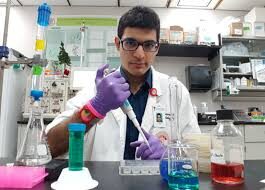Samples of My Work in Chemistry & Closely Related Areas
Sample Personal Statement for Graduate Study towards the Master’s Degree in Chemistry in Europe, Saudi Arabian Applicant
 A 29-year-old man from Saudi Arabia, I completed my BS Degree in Chemical Engineering in December of 2011 and I now have 4.5 years of experience as a professional researcher. I have contributed to investigations resulting in 4 published papers in internationally peer-reviewed journals, one of which I am listed as the first author. These investigations have also resulted in 9 patent applications.
A 29-year-old man from Saudi Arabia, I completed my BS Degree in Chemical Engineering in December of 2011 and I now have 4.5 years of experience as a professional researcher. I have contributed to investigations resulting in 4 published papers in internationally peer-reviewed journals, one of which I am listed as the first author. These investigations have also resulted in 9 patent applications.
XXXX University is my first choice for graduate school and I hope to continue to study in your program at the doctoral level after proving myself as a graduate student because of the sheer excellence of your university with its world class research facilities and the comprehensive nature of your program. My studies will be fully paid by the company for which I work.
I look forward to investing the balance of my professional life in the search for solutions that can help to solve energy/pollution problems, engaging in cutting edge research, and proving myself as a world-class scientist. I want to tackle challenges in Chemistry that are related to our search for energy forms that are both affordable and renewable. I am especially engaged in the study of catalysis and look forward to many lively discussions at XXXX with my colleagues who are also extensively engaged in the search for ways to reduce our dependency on fossil fuels as an energy source and the search for ways that alternatively energy sources such as Hydrogen production from water using sunlight can be made more affordable. I am deeply concerned with the way in which our dependency on the fossil fuel sources has such a huge, negative impact on our environment and I look forward to becoming a part of the community at XXXX where I will be able to brainstorm alongside so many like minded individuals.
My historical and ongoing research interests include nanotechnology, surface and materials science, and catalysis with emphasis on metal oxides, metals, novel nanostructured nanocatalysts for energy-related materials and everything having to do with materials science and environmental sustainability. I have special expertise in core- and valence-level photoelectron spectroscopies: XPS, UPS, and especially the synthesis and characterization of nanomaterials. I am especially pleased to bring to your research intensive program extensive experience in the design and building of state-of-the-art surface characterization equipment and ultra-high-vacuum-based (UHV) systems.
Highlights of my career so far include making the Dean’s List during two of my last three semesters as an undergraduate student in Chemical Engineering at the University of Alabama during the Fall of 2010 and the Spring of 2011. I have also particularly enjoyed my professional position since finishing my degree, serving as an Engineer with the SABIC CRI Center at KAUST since 2012 studying Ceria based catalyst by means of TPD, XRD, TEM, and XPS to gain insights into system properties from surface science perspectives; and finding correlations with hydrogen production through solar/thermal water splitting experiments. We are working on the design and installation of a surface science lab at the SABIC Corporate Research Center at KAUST. I thank you for considering my application to your distinguished program.
If you want your Statement of Purpose or Personal Statement to be successful, you have to write it in such a way as to make those in charge of the selection process curious about you and to look forward to meeting you. You need to portray yourself in your statement as the kind of person that they want to have in their program. I am a practiced master at drafting your story in the best, most eloquent fashion possible, in the way that is most appealing to those who make the selection. I am so certain of my ability that I draft the first paragraph of your statement free of charge and at no further obligation. If you really like the first paragraph that I produce, then I would then be honored to finish the statement on your behalf.
Iranian Chemist with Master’s Degree from Iran
 A chemist from Iran where I completed both my undergraduate and then Master’s Degree in Chemistry, I immigrated first to Canada where I am a permanent legal resident and now I am working in Houston Texas. I hope to return to graduate school here in the USA and it would be a great honor for me to be accepted to the PHD Program in Chemistry at XXXX University since I have made excellent professional strides working as a research chemist in industry for the past several years here in the West.
A chemist from Iran where I completed both my undergraduate and then Master’s Degree in Chemistry, I immigrated first to Canada where I am a permanent legal resident and now I am working in Houston Texas. I hope to return to graduate school here in the USA and it would be a great honor for me to be accepted to the PHD Program in Chemistry at XXXX University since I have made excellent professional strides working as a research chemist in industry for the past several years here in the West.
1st Paragraph for the PHD in Materials Science, Chinese Applicant
 Born and raised in China, I am a hard worker and a devoted student, demonstrated by the fact that I will soon be finishing my BS in Chemistry in the USA with a 3.8 GPA. I will also finish with a minor in history, a result of my wide ranging intellectual interests that include math and philosophy as well as the physical sciences. Nonetheless, it is in the field of Material Science that I seek to make my professional mark in life and my optimal contribution to the development of humanity. XXXX University is my first choice to earn the PHD Degree in Materials Science because of the sheer excellence of your program as well as its location.
Born and raised in China, I am a hard worker and a devoted student, demonstrated by the fact that I will soon be finishing my BS in Chemistry in the USA with a 3.8 GPA. I will also finish with a minor in history, a result of my wide ranging intellectual interests that include math and philosophy as well as the physical sciences. Nonetheless, it is in the field of Material Science that I seek to make my professional mark in life and my optimal contribution to the development of humanity. XXXX University is my first choice to earn the PHD Degree in Materials Science because of the sheer excellence of your program as well as its location.
I help as many applicants to graduate school in Chemistry as I can since I see this scientific discipline in particular as having great potential for resolving many burning economic and social issues of our day.
Five Black Chemists Who Changed the World.
Most Recently Edited Samples of My Work
- Petroleum Geology, Engineering Masters, Canada
- PHD Analytical Chemistry, Bangladeshi
- Master Business Analytics, Agricultural, Korean
- MA Mental Health Counseling, Kuwaiti
- PHD Composition and TESOL, Iraqi Translator
- PHD Linguistics, TESOL, Learning Tech, Iraqi
- Master’s PA, Physician Assistant Studies, Sri Lanka
- MA Human Rights and Conflict Management
- HRM, Human Resource Management, Saudi
- MS Financial Engineering, Instruments, Chinese
- MIS Masters Information, Dubai, Indian
- MISDI Mgmt of IS and Digital Innovation, Chinese
- Masters TESOL, Applicant from Pakistan
- Chiropractics, Philosopher, Pharmacy Supervisor
- MSIS Degree, Chinese Fluent in Russian
- Masters Degree in Finance, Saudi Arabian
- MBA International Business, Finance, Iranian
- Ph.D. in Linguistics, South Korean Applicant
- PsyD Program, PTSD, California
- Fellowship International Relations, Chinese HK
Statements of Excellence in Chemistry

Degree sought, field, or place of origin!
Great Accomplishments in Chemistry
Chemists work on molecular-scale phenomena, meaning they discover molecules that exist in nature and invent new molecules as well as new materials.
The molecular perspective of chemistry is fundamental to explaining complex behaviors of biological systems and therapeutic molecules, generally small organic molecules, are the medicines that change the course and progression of many human diseases. Some of the recent contributions of chemical science to advances in health and medicine are truly miraculous.
The discovery and development of safe and effective medicines by teams of medicinal chemists in the pharmaceutical and biotechnology sectors have progressed rapidly in recent decades, but mostly in recent years.
Some of these medicines include angiotensin-converting enzyme inhibitors for hypertension and rate-limiting enzyme inhibitors in cholesterol biosynthesis by the statin class of drugs, used in the control of cholesterol levels.
There have also been improved therapeutics for depression and schizophrenia by receptor subtype specific ligands: the HIV protease inhibitors and non-nucleoside reverse transcriptase inhibitors for the treatment of AIDS.
New medicines require new molecules. They emerge from chemical synthesis of natural products, synthetic chemical libraries, and rational design. Molecules that arise from nature teach us architectural complexity and functional group density, which has evolved into a valid utility in biological systems.
Some examples include lactams, statins, macrolides and taxanes. The advances in diversity-oriented synthesis methodologies have led to the creation of both small-focused libraries of specific scaffolds and large libraries numbering molecules in the millions as sources for screening new disease targets for therapeutic leads.
The rational design of new compounds has given rise to breakthrough products like Gleevec, which is the first rationally designed molecule to do specifically what is was designed to do (inhibit Abl-family kinases).
The continued advances in synthetic organic chemistry of both natural products and complex libraries have provided significant advances in the treatment of numerous diseases and ailments, and continue to surprise us all.
New molecular technology, like the invention of polymerase chain reaction (PCR) and DNA sequencers that can decode millions of DNA bases per day, has revolutionized the context of biology.
This has enabled us to decode the three billion DNA base pairs of the human genome. Multiple parallel signature sequencing analysis (MPSS) has also allowed for the observation of the entire transcriptome of a particular type of cell.
Chemical biology—a fusion of the two sciences—has come to the forefront in the last decade, and this is reflected, among other things, in the name change of several academic chemistry departments to departments of chemistry and chemical biology. Chemical biology applies chemical-scale molecular approaches to elucidate problems in biology. It often involves the interaction of small organic molecules with biological macromolecules (DNA, RNA, proteins, membranes, and organelles).
A few noteworthy discoveries include small molecules that dimerize and activate target receptor proteins; the biosynthetic incorporation of unnatural amino acids into proteins at specific sites; combinatorial biosynthesis of new antibiotics; biosensors to monitor calcium ions in cells and to localize proteins in subcellular locales; the directed evolution of proteins to create novel or improved properties; and in vitro selection of nucleic acids with specific binding or catalytic activities.
Advances in protein semi-synthesis (native chemical ligation and expressed protein ligation) have also led to the creation of certain proteins with novel properties.
Much of the work at the biology and chemistry interface has changed from hypothesis-driven science to discovery science; human biology, specifically, is evolving from an information-poor arena to an information-rich science amenable to a systems approach, which will revolutionize medicine from being reactive to predictive to preventive. These are very exciting times.
Are you keen to study these subjects and get stuck in yourself?


